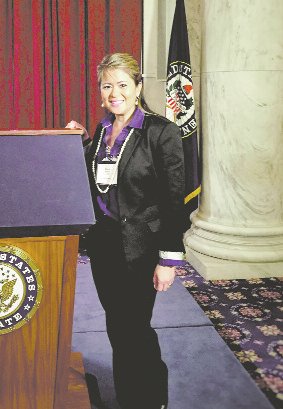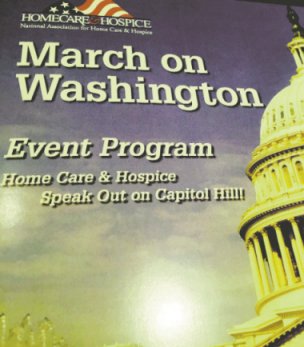
By: Melody Dizon
When belief becomes a value….When value becomes a passion….
When passion becomes a voice……When voice becomes action…….
When action becomes advocacy……
To be an advocate is to be an intercessor, a supporter, a person who pleads for in behalf of the other. The last few days, the term advocate became alive to me in more ways than one. Being a nurse the last 22 years of my life, I’d like to say, I’ve supported a cause, stood up for what I believed in, and even fought with sectors that get in the way in taking care of my patients. However, none would compare with what I had to experience when the board members from Association of Certified Home Health Agencies in Illinois (ACHHAI), namely, Norma Figueroa from American Home Care Express and Elizabeth Regacho from Alpha Home Health and I, Melody Dizon from Supreme Home Health, Inc., had to attend March on Washington and join other health care organizations lobbying on Capitol Hill our cry to expand, reform, repeal, ban, allow, oppose any legislation that would give our Medicare beneficiaries limited access to their health care benefits.
This was my first time attending such event, though we may have had attended many seminars sponsored by the National Association for Home Care and Hospice (NAHC). The idea of cohesiveness or grouping ourselves together with agencies alike sharing the same sentiments will create a bigger impact on Capitol Hill. The issue at hand becomes more powerful because it gets drilled to lawmakers every 30 minutes when each delegation is given their specific timeframe to speak to their respective Senators or respective Legislative assistant. We are very thankful to the Illinois Home Care and Hospice Council especially their Executive Director, Jan Grimes, who was very welcoming of us to have ACHHAI in their group. Our panelists were comprised of President of NAHC, Val J. Halamandaris, JD , who is one of the co founders of the organization, William A. Dombi, VP for Law, who is also very dedicated to the cause of NAHC, Honorable Mark P. Begich , VP for Policy and Development who fully supported the Association from day one as they explain current trends, proposed rules and how it can affect us and most importantly the beneficiaries. Deputy Administrator and Director of the Center for Medicare, Sean Cavanaugh, was also there explaining in graphs and the trajectory on how CMS views home health and hospice and where it is heading in conjunction with other healthcare sectors that would affect its delivery and operations, which in my opinion stirred us more because it made things more unclear for the future of home health.
Because we are from Chicago, hence all our assigned meetings are from Congressional district of Illinois.
Senator Richard Durbin Jessica AMcNiece (Professional Staff)Assistant}
Senator Rodney Davis Miles Chiotti (Legislative Assistant)
Senator Mark Kirk Andrew Vogt (Legislative Aide) Directo
Senator Adam Kinzinger Josh Baggett (Legislative Director)
Senator Cheri Bustos Steffanie Bezruki (Legislative Correspondent)
Senator Tammy Duckworth Virginia Hayes (Legislative Assistant)
Senator John Shimkus Christopher Sarley (Policy Director)
Leg. Asst. Senator Luis Gutiérrez David Velazquez
(Legislative Assistant)
Senator Peter Roskam Aaron Krejci (Legislative Director)
Senator Jan Schakowsky Amy Kelbick (Senior Policy Advisor)
All of them were kind enough to listen to us and hear our individual stories about real patients and real situations happening as it is. All we could ask really is their support and to hear where we all are coming from. It is important for lawmakers to hear both sides if certain laws gets passed, most especially how it will affect the targeted population.
So here are the proposed changes that we feel so strongly about:
1. To ban the use of prior authorization in Medicare HH services: As it is now, when an agency receives an order for HH, a nurse is deployed based on the order. If an authorization is needed, there will be a delay in care, thereby the use of emergent services will be utilized more because authorization is not readily given or may have to wait for a few days.
2. To repeal or reform the face-to-face physician encounter documentation requirements: We know how important face-to-face encounter is because both parties need to be aware what the treatment plan would be. However, what we are not asking for is to have clinicians become paper pushers to the providers. Yes, an encounter occurred, yes, there is a diagnosis and, yes, the patient is homebound, but to word it the way the third party vendors wanted the doctors to word it, it becomes somewhat technical. And if documentation is insufficient, there would be denial of service, denial of reimbursement, then denial of patient care and the one who truly suffers is the patient.
3. Allowing nurse practitioners and physician assistants to sign home health plan of care. This Home Health Care Planning Improvement Act (S.578; H.R. 1342) is currently being co-sponsored by The Illinois Delegation by Senators Durbin and Kirk; Representatives D. Davis, R. Davis. Dold, Foster, Hultgren, Lipinski, Quigley, Rush and Schakowsky. Home Health Care should be accessible regardless of where the patients reside. If NP’s and PA’s are utilized, then more patients can avail of home health.
4. Opposing a “sick tax” or block efforts to impose a fee paid by patients to access Medicare Home Health Services. The imposition of a home health co-pay would be a sick tax on some of the oldest, poorest, sickest Medicare beneficiaries; shifting seniors to a more costly hospital or nursing home settings and increase Medicare and Medicaid costs. As it is, some of our already under-resourced patients who are on a fixed income is having difficulty buying medicines and their basic needs, what more if they were to pay the “sick tax” law. The use of unnecessary emergent settings, unnecessary hospital admissions, and unnecessary longer hospital stays will increase in numbers and all our efforts in reducing all of those is counter-intuitive, if and when this bill gets passed.
The Invited Senators who were present during “A Tribute to Our Home Care and Hospice Heroes” were:Senator Susan Collins (R-ME); Senator Chuck Grassley (R-IA); Chair Special Committee on Aging; Budget Committee Health, Education, Labor & Pensions Finance Committee; Senator Sheldon Whitehouse (D-RI); Senator Debbie Stabenow (DMI), Health, Education, Labor Finance Committee (Ranking Member And Pensions Committee, Subcommittee on Health), Budget And Special Committee On Aging Committee; Senator Jerry Moran (R-KS); Senator Al Franken (D-MN),Member, Veterans Affairs Committee Member, Health, Education, Labor & Banking, Housing & Urban Affairs Provisions Committee, Energy & Natural Committees; Appropriations Committee Resources Committee; Judiciary
My take-aways:
It was good. I felt good. I don’t know what may come out of it. But I know it came from a place where I feel for the patient. There are times when I get frustrated and I just don’t know what to do when the healthcare system fails me, I go beyond my call to help because there is no other way for the patient, I end up feeling somehow at peace and relieved.
I always end my speech to the representative/ assistants when it was my turn to speak – what if, I wasn’t the nurse that got assigned and truly there is no medication for patient, no food on the table, no family, no resource– how do you expect me to sleep at night knowing somebody I know fell into the “cracks “of the system”? Am I to keep filling this up, provide this, get that, just so my patient can hang on for just a little while? That’s the word– only for a little while. Because after awhile, when all else is said and done and there’s nothing more to replenish and to give, what will happen to our elderly? Yes, we can be compassionate to them.
But if the system is turning the other way and not really looking at what it means to them, am I helping the system be a broken system? I don’t know. I end here folks. To help is always good. To care is also always good. To speak up, stand up and fight is more than good– it will not only help that patient but the next patient, and the next patient and the next patient. Let’s continue to march this on Washington.

Melody Dizon in Washington, D.C. for home health advocacy.


Taken after the National Legislative and Regulatory Update at Mayflower Hotel, L-R: NAHC PRES. Val J. Halamandaris, JD; ACHHAI Board Member Elizabeth Regacho; ACHHAI Board Member Melody Dizon Columnist, Via Times’ Unchained Melody & CPRTV “Health Matters” Host; ACHHAI Board Member Norma Figueroa; Honorable Mark P. Begich, VP for NAHC
 VIA Times – April 2016 Issue Vital News, Vibrant Views for Asian Americans in Chicago & Midwest
VIA Times – April 2016 Issue Vital News, Vibrant Views for Asian Americans in Chicago & Midwest

